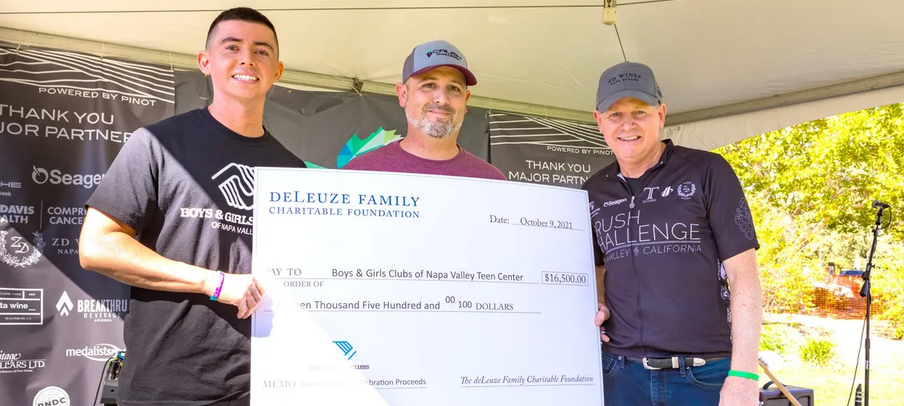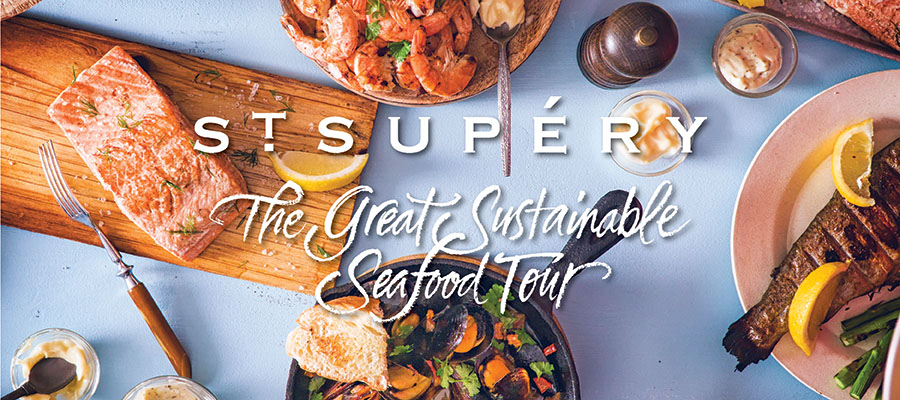Jacques Cousteau’s Granddaughter Leads the Charge to Save Our Oceans
Alexandra Cousteau practically grew up in the ocean, scuba diving from the time she was 7 years old with her grandfather, world-renowned ocean explorer and filmmaker Jacques Cousteau. As they continued their undersea explorations over the years, she saw the places she loved as a child decline, and came to realize that the world’s oceans—once so abundant and filled with life—are in crisis.
“Every year, we’ve lost fish and whales and life a little bit more, to the point where we’ve lost half our ocean,” Cousteau told St. Supéry Estate Vineyards & Winery CEO Emma Swain during a recent episode of the podcast series St. Supéry #GivingTuesday Chats, which highlights the work of philanthropic entrepreneurs. “It occurred to me after my children were born that they could be the generation of my family that writes the obituary for the ocean—and that was heartbreaking to me because I could swim before I could walk.”
Inspired by the conservationist ethic she learned from her grandfather and father, Cousteau co-founded Oceans 2050. Launched in 2020, the organization is dedicated to restoring the world’s oceans to their former abundance within a generation.
“That was a turning point when I let go of conservation and embraced restoration as a fundamentally different pathway to a different future,” she said. “The more we work on this, the more hopeful we become that we can actually chart a new path. It’s pretty exciting, actually.”
Seaweed to the Rescue
An important and promising area of focus is restoring ocean forests, which create habitat for biodiversity, oxygenate the water and sequester carbon. As climate change causes raises acidity levels in ocean waters—endangering marine organisms such as coral—kelp forests also help de-acidify our oceans.
Fortunately, seaweed farms provide the same benefits as wild seaweed forests while also aiding the communities around the world that grow them. Additionally, cultivating seaweed helps protect and restore wild forests by lowering the incentives for people to harvest them.
“We see a lot of promise and potential in seaweed farming and are working to help scale that up through science and carbon protocols,” Cousteau said. “We’re driving investment so that we can we can scale seaweed farming up to 1,000 times what is being done today without having a negative impact on the environment.”
Part of that effort is educating people in the West about the many applications for seaweed. Along with incorporating it as a healthy ingredient in foods like smoothies and burgers, seaweed can be used in fertilizers and as a plastic alternative in cosmetics.
With two garbage trucks’ worth of plastic going into the ocean every 60 seconds, reducing the use of plastics is crucial to Oceans 2050’s mission. Such plastics not only endanger marine life, they are harmful to humans.
“We eat the equivalent of one credit card’s worth of plastic every week in our food and beverages—micro-plastics that are present there—and that’s having an impact on every aspect of our wellbeing,” said Cousteau. These plastics originate in people’s kitchens and communities before making their way into oceans and being consumed by fish.
The solution, she says, is not to put the burden on consumers to recycle, but for industry to create ocean- and eco-friendly alternatives to plastic.
Coral Reef Restoration
Like seaweed forests, coral reefs play an important role in the health of our oceans.
“Coral reefs are the most critical ecosystems in the ocean,” Cousteau noted. “They are possibly the most biodiverse and abundant ecosystem on Earth, and yet we have no real financial incentive to protect and rebuild them.”
Making that happen will require figuring out ways to create and monetize products that will promote coral reef restoration, and to develop the technology to restore the reefs at a faster pace. The current process involves hanging fragments of corals, letting them grow out, and replanting them in the reef—a time-consuming undertaking that doesn’t always work.
“One of the things that we’re working on at Ocean’s 2050 is how we can take that technology to scale and make it something where all of us can be participants in the in a way that feels meaningful, and in a way where we can actually see progress. The really great news is that life comes back in the ocean so much faster than it does on land. And if we give it a chance, it will regenerate.”
Supporting Sustainable Seafood
Another way to rescue the oceans is to make it easier for consumers to identify and purchase sustainable seafood. This can be achieved by creating transparent supply chains linked to apps that allow people to trace the fish they’re buying back to where and how it was caught.
“There is a direct connection to the seafood that we find on our plates and many instances of illegal, unreported and unregulated fishing—which basically means pirated fish,” Cousteau explained. “Buy fish from a fishmonger that has traceable seafood and can tell you who caught it and where it came from. The more we can do to express a desire for traceable seafood, the more it will help create momentum in that direction.”
Consumers can also visit St. Supéry’s Sustainable Seafood Tour webpage to learn about sustainable seafood purveyors and restaurants that champion responsibly-sourced seafood.
While saving the world’s oceans in a generation may seem like an insurmountable challenge, there are many ways to help move the needle.
“We’re working on a whole suite of digital tools that will give people an opportunity to be directly involved in ocean restoration around the world,” said Cousteau.
For those who would like to make a financial donation to the cause, St. Supéry is hosting a luncheon for Oceans 2050 on August 19, featuring delicious sustainable seafood and seaweed dishes. The first 30 people to contribute $500 or more will receive an invitation to join Emma Swain and Oceans 2050 for lunch at the winery in Napa Valley. (Make your contribution directly through the Oceans 2050 website and be sure to note St. Supéry on your donation.)
#givingtuesday #oceans2050 #sustainableseafood #everydayheroes








